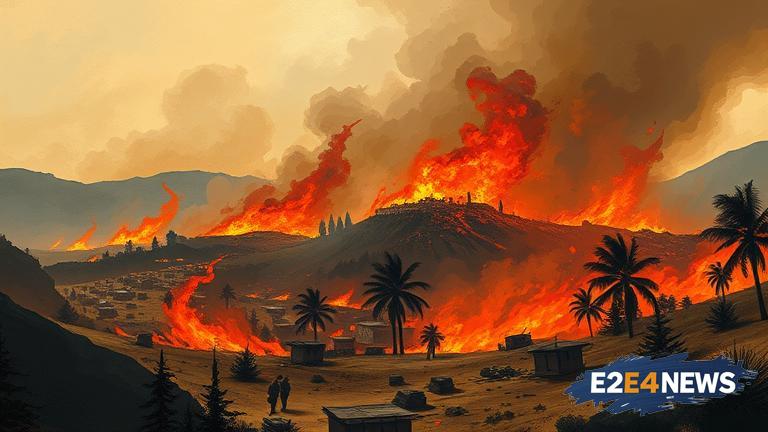A series of devastating fires has swept through various regions of Greece, leaving a trail of destruction and displacement in its wake. The affected areas include Kryoneri, Messinia, Arcadia, Chania, and Kythira, with the fires burning for several days and causing significant damage to properties and the environment. According to reports, 5 red houses and 34 yellow houses have been affected by the fires, with many more at risk of being destroyed. The Greek authorities have been working tirelessly to contain the fires and provide support to those affected, with firefighters and emergency services personnel battling to bring the blazes under control. The causes of the fires are still being investigated, but it is believed that a combination of hot weather, strong winds, and human activity may have contributed to the outbreaks. The Greek government has pledged to provide support to those affected, including financial assistance and housing for those who have lost their homes. The international community has also offered its support, with several countries providing aid and assistance to help Greece cope with the disaster. The fires have not only caused significant material damage but have also had a profound impact on the local environment and wildlife. Many animals have been forced to flee their habitats, and there are concerns about the long-term effects of the fires on the ecosystem. The Greek authorities are working to assess the full extent of the damage and to develop a plan to rebuild and restore the affected areas. The fires have also raised concerns about the need for more effective measures to prevent and respond to wildfires, particularly in areas prone to hot and dry weather. The Greek government has announced plans to increase funding for firefighting services and to implement new measures to prevent wildfires, including the creation of fire breaks and the use of advanced technology to detect and respond to fires. The international community has praised the Greek authorities for their response to the disaster, but has also called for more to be done to address the root causes of the fires and to prevent similar disasters from occurring in the future. The fires have had a significant impact on local communities, with many people forced to evacuate their homes and seek shelter elsewhere. The Greek authorities have set up temporary shelters and are providing food, water, and other essential supplies to those affected. The fires have also had a significant economic impact, with many businesses forced to close and tourism affected in the region. The Greek government has announced plans to provide financial support to businesses and individuals affected by the fires, and to invest in measures to prevent similar disasters from occurring in the future. The fires have highlighted the need for greater international cooperation and coordination to address the global challenge of wildfires, and for more effective measures to be taken to prevent and respond to these disasters. The Greek authorities are working closely with international partners to share best practices and to develop new strategies for preventing and responding to wildfires. The fires have also raised concerns about the impact of climate change on the environment and the need for more effective measures to be taken to reduce greenhouse gas emissions and to mitigate the effects of climate change. The Greek government has announced plans to increase investment in renewable energy and to implement new measures to reduce energy consumption and greenhouse gas emissions. The fires have had a profound impact on the people and communities affected, and it will take time and effort to rebuild and recover from the disaster. However, with the support of the international community and the determination of the Greek people, it is hoped that the affected areas can be rebuilt and restored, and that measures can be taken to prevent similar disasters from occurring in the future.
